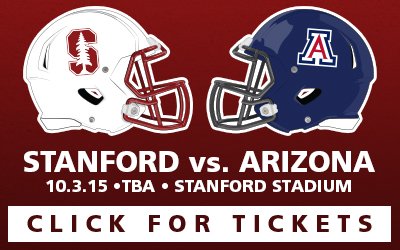STANFORD, Calif. – Olympic hopeful Ryan Mango ‘13, one of the greatest wrestlers in Stanford history, has joined the Army.
Mango left Tuesday for basic training in Fort Sill, Oklahoma, after a collegiate career in which he was a two-time All-America and a two-time Pac-12 champion on some of the Cardinal’s best teams.
Nicknamed “Air Mango” for his spectacular throws, Mango will settle into full-time training in the Greco-Roman style as part of the U.S. Army World Class Athlete Program in Fort Carson, Colorado. The team includes some of the best in the country in Mango’s 59-kilo (130-pound) weight class, including top-ranked Spenser Mango, a two-time Olympian and Ryan’s older brother.
Despite the cutthroat competition for national-team spots, family ties run deep. Deborah Mango raised three children after their father was fatally shot in a St. Louis drive-by when Ryan was a toddler. Now, it seems doubtful there will be an Olympic Games in 2016 or 2020 without a Mango in it.
Before leaving for basic training, Mango was interviewed by GoStanford.com.
“I don’t get down on myself if I have a poor tournament because I know there are bigger things in life. Perspective: Wrestling for Stanford builds that.” Ryan Mango
Q: How did you come to this decision?
A: For the past eight months, I was at the Minnesota Training Center (a Greco training club in Minneapolis). That was the first club I explored after I left Stanford, but it wasn’t working out as a well as I hoped.
I started talking to my brother and his coach, Shon Lewis. They suggested I should join the Army. The benefits in wrestling and for a future career make up for any time lost off the mat in basic training. He told me I should have done it coming out of Stanford. I listened to him this time.
After 10 weeks of basic training, there is advanced individual training for five weeks, where you learn skills for the job you perform for the Army, at Fort Leonard Wood, Missouri. After that, I’ll be assigned to the wrestling company and that will be my responsibility for the Army.
Q: How long of a commitment is it?
A: I signed a six-year contract. That’s pretty much the duration of my wrestling career. I don’t want to wrestle too much past 2020. The way my body’s feeling now … I’m still young (23), but I want to do other things, use my degree and pursue a more professional career. I want to wrestle through 2020 and my contract’s up in 2021. It was a good fit. I know most of the guys on the team, and they know me.
Q: What was the biggest draw?
A: Seven of the top 10 guys in the country, including myself, are at my weight. So, for training partners, it’s the best place around. Plus, it’s next to the Olympic Training Center. We actually join practices with them sometimes and the national team coaches are right there. Also, I’m comfortable with Coach Lewis. He knows what it takes to get on the podium.
Off the mat, if you’re a post-collegiate wrestler in training, money’s an issue. But the Army really takes care of its athletes. I’ll have no problems financially supporting my training. Also, I’ll gain a lot of experiences that I could put on my resume. Plus, I’ll have a chance to continue my education for free. It’s the total package – wrestling, career development, and also just being around my family. My brother, his wife, and his son are all there in Colorado Springs.
Q: Is this the first time you and Spenser will be teammates?
A: Yes, he was getting out of high school when I was getting in and we went our separate ways. This is the first time we’ve been on the same team outside of a national team and really training day in and day out in the same environment.
Q: How do you feel about competing in the same weight class?
A: It’s not really feasible for either of us to move up. I’m the bigger of the two. Even for me to move up, it would be out of my range (to 66 kilos/145.5 lbs.).
We will compete, but it really doesn’t bother me and I don’t think it bothers him. We’ve almost had to wrestle a couple of times. If it happens, it happens. It’s not like I’m going to be mad if my brother beats me out for a spot, and I don’t think he’d be mad if the reverse happened.
It’s actually a great opportunity because he’s coming toward the end of his career – he’s planning to retire in 2016 -- and I’ll be able to watch him every day and learn. That’s going to help me in the long run. If this Olympics doesn’t happen, there’s another one, and there are World Championships in off-years. It’s not something that bothers me. It’s just the nature of the sport.
Q: What do you admire most about Spenser?
A: He’s found a way to be consistent after all these years. He’s been No. 1 since 2007 and never lost in the U.S. in his weight. He’s made every World and Olympic team. The past two years he made it to the bronze-medal match at the World Championships only to lose by one point each time on referees’ decisions. Even after that, he still comes back and finds ways to get better. It fuels him. If that happened to me, I don’t know if I’d react as well as he does.
Q: How does the Greco-Roman style fit your strengths?
A: The basic difference between folkstyle, or freestyle, and Greco-Roman is Greco’s all upper body. You can’t touch or attack their legs or anything below the waist. It’s mostly throws. Those moves are harder to hit in freestyle because someone can hook your leg. For me, Greco fits me because ever since I was a kid, I loved to throw. I like hitting the big flashy moves.
When I got to the end at Stanford, I knew that if I was going to keep wrestling, it was going to be Greco, because that was the style I liked the most. At this level of your career, you quickly find out whether you wrestle because you love it. You don’t do it to please others anymore. If you love the sport, you’re willing to accept some hard things that come along with wrestling full-time.
Q: What did you get most out of wrestling at Stanford?
A: Stanford helped me see the bigger picture. Sure, wrestling was high on my list of importance, but there are people around you doing great things in so many different facets in life that it really opens your eyes. That’s changed my approach to wrestling. I don’t get down on myself if I have a poor tournament because I know there are bigger things in life. It helps keep things in perspective. At a lot of other places, guys see wrestling as the No. 1 thing and if they have a disappointing performance, it’s over. They don’t know what to do from there. Perspective: wrestling for Stanford builds that.
Q: You graduated with a human biology degree. How do you think you might use it?
A: The Army has a two-year physician’s assistant program, which they pay for. It’s flexible enough where I can do it while wrestling and meet those requirements. That would be a good way to jumpstart my career after wrestling and get a secure job. After that, I actually might try my hand at corporate health. That’s the rough plan. We’ll see how it goes.
Q: Did your mother, a nurse, inspire a career in health care?
A: I used to go to work with her and bug her, and she’d let me walk around the floor and sit in on some stuff. She saw that I was interested. It was a way for me to see all the opportunities out there, and not to settle for less, but to really try to be what I wanted to be.
Q: How did your mother raise a successful family by herself in the inner city?
A: To this day, I still wonder how she did it.
Q: How did she hold it together after your father was killed?
A: She used us as motivation. Instead of seeing it as a burden -- having me, my brother and my sister -- she saw it as a challenge and opportunity to be something greater, and to leave her stamp on us. She was able to push through and do that. I think that rubbed off on us, because we see life in the same light – you’ve got to do what you need to do to make it and provide for your family.
Q: Have you ever thanked her?
A: A lot.











